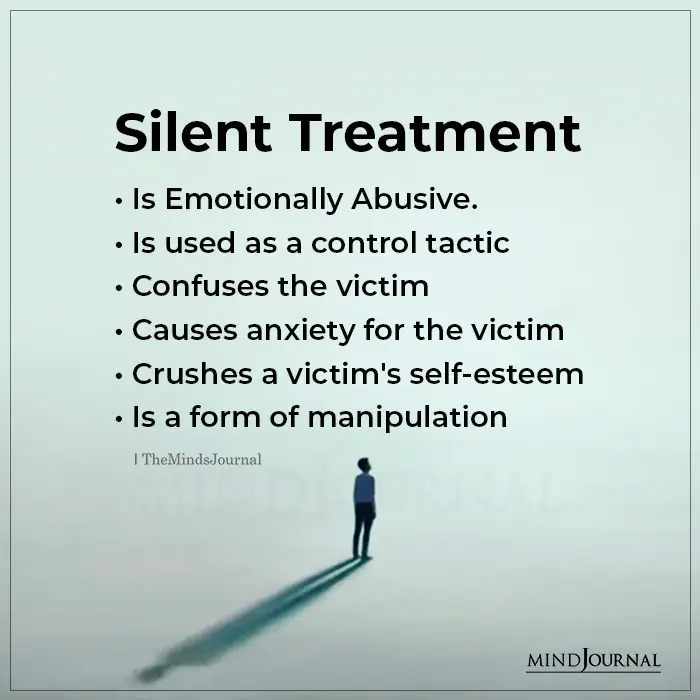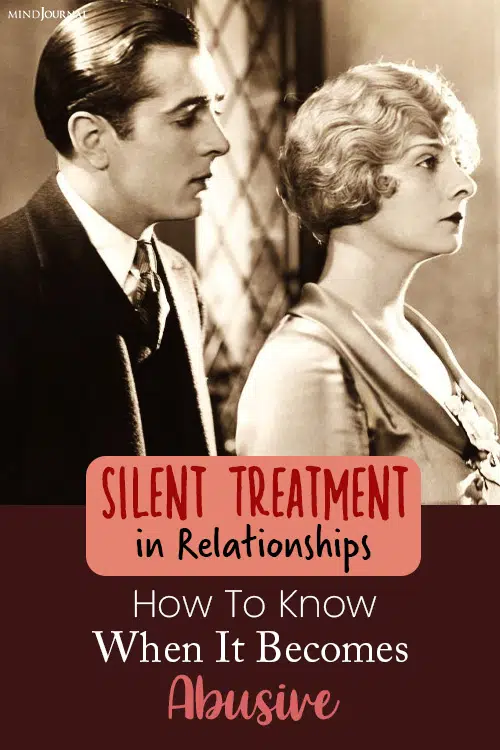When it comes to romantic relationships, and marriage, silence or silent treatment has always had polarising opinions from people. Some say silence is sometimes a good thing, and some say that getting the silent treatment from their partners is one of the most stressful experiences ever. In order to truly understand whether it is right or wrong, it is important for you to understand whether both these terms mean the same thing or not.
Why Do People Turn Towards The Silent Treatment?
There are several reasons as to why some people give the silent treatment to their partners, instead of just talking it out. Here are some of the reasons:
1. To manipulate or control the person, and situation to turn it in their favor.
2. Punish their partner.
3. Wreak emotional pain and trauma.
4. Feeling excessively overwhelmed, and not knowing how to handle the situation.
5. Unsure about how their partner will react when they give their opinion.
6. Scared and apprehensive of their partner’s temper.
7. Expecting the problem to disappear simply by ignoring it.
8. Attention seeking, as in, their partner is not giving them enough attention, and this is a twisted way of changing that.
9. Thinking that their partner will not listen to them, so it’s useless talking about it.
10. Tormenting their partner, by trying to make them go through the same hurt they are.
Related: The Silent Treatment Vs. No Contact: What’s The Difference?
When Is Silent Treatment Acceptable?
Fights, arguments, and disagreements are a part and parcel of every relationship. Sometimes, when a fight escalates too much or goes horribly south, the wise thing to do is take a timeout and give some space to each other. Or when your partner is indulging in name-calling, you don’t have to engage with them. In this case, being silent doesn’t mean you are ignoring your partner, it simply means that both of you are trying to gather your thoughts, diffuse the heated situation, and attempting to understand the other person’s point of view.
The only time silent treatment is probably acceptable is when your partner hurts you too much about something, and you need some space and time away from them to feel a bit better, forgive them and heal yourself. But, keep in mind that the silent treatment should not go on for days, or weeks, as this will only disintegrate your relationship further.
When Is Silent Treatment Not Acceptable?
On the other hand, if someone is serving a big, cold plate of silent treatment to you, it is not always a good or healthy thing. If silent treatment is being used to mentally, and emotionally abuse, and torment a person, it is a strict no-no. Narcissists tend to employ this tactic in order to get their toxic demands fulfilled, and also use it as their narcissistic supply.
The silent treatment can be a very annoying, and sometimes disturbing thing to deal with. If this is not addressed properly, or handled properly, it will end up doing more harm to your relationship than good. It is vital to dismantle this communication pattern and fall back on healthy communication.
Related: 6 Steps To Disarm The Silent Treatment Without Making it Worse
When Does Silent Treatment Become Abusive?
The silent treatment constitutes of the following behaviors:
1. Lack of acknowledgment of what you have to say.
2. Refusal to talk to their partner.
3. Acting as if they don’t hear you.
4. Screening your text messages, calls, and every other means of communication.
5. Lack of acknowledgment of your opinions, and feelings.
6. Completely avoiding you, even in social situations.
7. Disregarding your efforts to communicate with them.
8. Ceasing all communication with you for a long time, and then suddenly reappearing and acting as if nothing was ever wrong.
9. Behave in ways that make you feel invisible, irrelevant, unnecessary, and a burden.

Here Are 5 Ways You Can Respond To The Silent Treatment
1. Give your partner some space.
Personal space is very important for a successful relationship, more so when there is a lot of friction happening between you both. When you have a fight, and your partner clearly states that they need some space, avoid trying to understand what they are thinking, or for how long they are going to need space.
Fights are never pleasant, and everyone has their own way of dealing with their feelings. So you might be the one to constantly talk about it with the hopes that it might smooth things out, but your partner may not be on the same page. Give them some space to cool down, and get back to you with a clear head, and calm demeanor.
Another thing you should always keep in mind is that never ever do their thinking for them, otherwise, they will never be able to express their opinions and feelings honestly to you.
2. Give an apology you truly mean.
Giving an apology does not simply mean saying the word ‘sorry’; you have to actually mean it. An insincere apology will make your partner feel more upset, and the fight will never be resolved healthily. If your apology is not genuine or true, then how will you be able to rectify the problem that caused the fight in the first place? Maybe a superficial sorry might help temporarily, but will it help in the long run? You are simply putting a band-aid on an open wound without even treating it first.
But, if you apologize genuinely, you will be able to empathize with your partner, and understand what hurt them, and why. Only a genuine apology will be able to close the distance between you two. If the fault is yours, admit it, and promise that you will seriously work on it, so that it doesn’t happen again. This will not just help you sort everything out; it will also make your partner trust you more.

3. Focus on the rules of healthy communication.
One of the strongest pillars of a fulfilling and successful relationship is healthy communication, and without it, lots of relationships bite the dust. After an emotional outburst, communication takes a hit, and no matter what you do, everything seems to go downhill from there. This is because when you are angry, hurt, anxious, or panicked, your body is filled with adrenaline, which is known as “flooding”. Flooding happens when your mind finds it difficult to unite all your emotions together.
When a person goes through flooding, they have two options to choose from – fight or flight. The person who chooses flight tends to give the silent treatment. In such a situation, no matter what you do, they will refuse to talk to you, or even acknowledge you. The best way to handle this situation is to let them be for some time (you also take some time to cool down), and then agree on a time when both of you will come together to talk about the fight, and settle it.
Related: Why The Silent Treatment Never Works And 6 Ways To Communicate Better
4. Try to understand if there are personality differences.
This is one thing that most people tend to overlook when it comes to dealing with the silent treatment, and that is personality differences. Are you an extrovert, and your partner an introvert?
If yes, then introverts tend to need more time to deal with their feelings, and process everything. When faced with an emotionally intense situation, they tend to withdraw more into themselves, and only come out of their shell, when they have fully processed everything.
In such cases, convey to your partner that you respect their silence, and you will give them the time and space they need to feel okay. However, also tell them that you want to talk about what happened after some time so that both of you can be on the same page. Taking time is okay, but not talking for hours, and days, is extremely unhealthy.
5. Never hold on to grudges.
When your partner starts talking to you, or when you both sit down together and try to make things right, remember never to hold grudges. The whole point of healthy communication is to understand what affects you both, what your weak points are, and what not to do to avoid such conflicts in the future.
Communication does not mean that you simply just talk; in order to make it effective, both of you need to understand each other. Unless you understand what makes them completely shut down, and give you the silent treatment, the same thing will keep on happening. End your conversation with an enhanced understanding of each other, and how both of you can help support each other in the future.
The silent treatment only works temporarily, and if you want to have a healthy relationship, then you need to understand this. Certain situations might not make it easy for you or your partner to have transparent communication, but you should never make it a habit. It will only put your relationship on troubled waters, and by the time you realize this, it might be too late.
If you want to know more about the silent treatment, then check this video out below:











Leave a Reply
You must be logged in to post a comment.